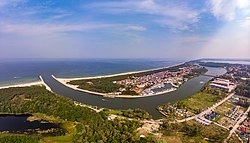| Dziwnów | |
|---|---|
 Aerial view of Dziwnów along the Baltic Sea Aerial view of Dziwnów along the Baltic Sea | |
 Flag Flag Coat of arms Coat of arms | |
 | |
| Coordinates: 54°1′N 14°45′E / 54.017°N 14.750°E / 54.017; 14.750 | |
| Country | |
| Voivodeship | |
| County | Kamień |
| Gmina | Dziwnów |
| First mentioned | 1243 |
| Town rights | 2004 |
| Government | |
| • Mayor | Łukasz Dzioch |
| Area | |
| • Total | 4.93 km (1.90 sq mi) |
| Population | |
| • Total | 2,595 |
| • Density | 530/km (1,400/sq mi) |
| Time zone | UTC+1 (CET) |
| • Summer (DST) | UTC+2 (CEST) |
| Postal code | 72-420 |
| Area code | +48 91 |
| Car plates | ZKA |
| Voivodeship roads | |
| Website | https://www.dziwnow.pl |
Dziwnów (German: Dievenow) is a town in north-western Poland situated on the Baltic Sea at the mouth of the river Dziwna which divides it into the right-bank part containing the center of the town, belonging to historical Farther Pomerania, while the left-bank part is located in Western Pomerania, with both parts connected through a bascule bridge. It is a part and the seat of the eponymous Dziwnów municipality within Kamień County, West Pomeranian Voivodeship. As of December 2021, the town has a population of 2,595.
History

The territory became part of the emerging Polish state under its first ruler Mieszko I around 967 and the battle at Julin Bridge took place nearby in 1170. The first mentioning of the village in chronicles dates back to 1243. It remained a small fishing village in a sparsely populated area. This changed when the village came under Prussian rule and more people started to settle in the village. Due to its seaside location the village slowly transformed from a fishing village into a holiday resort. At the end of the 19th century, salt springs were discovered, and the first sanatorium was established. As a result the town became a popular spa town in the German Empire. In the 1930s, military barracks were built. During World War II, in June 1944, American army conducted air raids on the Nazi German garrison in the village. The historic church was destroyed in the final stages of the war. Polish troops entered in the city May 1945 and the German population was expelled or fled. In accordance with the Potsdam Agreement the city became part of the Polish People's Republic.
In 1949 and 1950 in the local garrison there was a military hospital for Greeks and Macedonians wounded in the Greek Civil War. In total, around 2,000 people were treated there. Later on, in the 1950s, the hospital staff co-created the Military Medical Academy in Łódź. In 1958 Dziwnów was granted urban-type settlement status and afterwards a port was built. The development of the settlement in the following decades led to the granting of municipal rights in 2004. From 1964 to 1986, the 1st Assault Battalion, which was considered one of the best trained units in the history of the Polish Army, was stationed in Dziwnów.
In 2004, Dziwnów received town privileges
International relations
See also: List of twin towns and sister cities in PolandDziwnów is twinned with:
 Gorzów Wielkopolski, Poland (2014)
Gorzów Wielkopolski, Poland (2014) Sosnowiec, Poland (2013)
Sosnowiec, Poland (2013) Werneuchen, Germany (1993)
Werneuchen, Germany (1993)
Gallery
References
- ^ "Local Data Bank". Statistics Poland. Retrieved 2022-08-02. Data for territorial unit 3207014.
- Ortsnamenverzeichnis der Ortschaften jenseits von Oder und Neiße by M. Kaemmerer
- Labuda, Gerard (1993). "Chrystianizacja Pomorza (X–XIII stulecie)". Studia Gdańskie (in Polish). Vol. IX. Gdańsk-Oliwa. p. 47.
- ^ "Historia Dziwnowa". dziwnów.pl (in Polish). Retrieved 26 November 2019.
- ^ Kubasiewicz, Izabela (2013). "Emigranci z Grecji w Polsce Ludowej. Wybrane aspekty z życia mniejszości". In Dworaczek, Kamil; Kamiński, Łukasz (eds.). Letnia Szkoła Historii Najnowszej 2012. Referaty (in Polish). Warszawa: IPN. pp. 116–117.
- "1 Batalion Szturmowy". dziwnów.pl (in Polish). Retrieved 26 November 2019.
- "History - Municipality of Dziwnów". www.dziwnow.pl. Retrieved 2024-02-22.
- "Miasta Partnerskie". dziwnow.pl (in Polish). Gmina Dziwnów. Retrieved 2022-08-02.
External links
| Gmina Dziwnów | ||
|---|---|---|
| Town and seat |  | |
| Villages | ||




